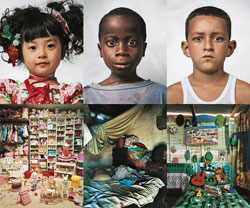A newly established minor in childhood studies was added to the list of University programs this fall to help students understand the stresses and the experiences of children from a global perspective, according to Robyn Holmes, a professor of psychology.
The minor was developed through the Department of Psychology, and will be spearheaded by Holmes. “If you think about the 21st Century experience, right with globalization, increase in migration, social media access, intergroup contact, and the movement of people, some voluntary, some not. Children are kind of caught up in that movement,” she said.
Holmes continued, “It’s nice to understand that not every child gets breakfast before they go to school, some children are homeless, some children will be forced to work in horrible conditions, girls will be sold as slaves and prostitutes, and some children will be so affluent that they will be driving in sports cars and private jets before their fifth birthday.”
According to Holmes, the minor took about 18 months to create. Holmes spoke with professors at Rutgers University’s doctoral program of childhood studies to decide how it might work at the University’s undergraduate level.
Holmes then petitioned the idea to Monmouth University department chairs, received approvals from undergraduate studies, and polled students for interest. “Before the minor was approved by undergraduate studies, I began to poll students, and the student interest was very high,” she said.
Mariel Acevado, a junior psychology student, now has a minor in Childhood Studies. “I signed up for the minor literally one day after Doctor Holmes sent out the email. I’m a social work major and as a career I want to work with children, so I felt like this minor was a perfect fit and opportunity to enhance my knowledge on children. I was a psych minor and although those classes are strong and fulfilling, it was too broad of a minor,” she said.
“I like that it concentrates on the studies of childhood and that the classes offered allows me to narrow it down to what I really want to study. I’m really excited to take all my classes next semester; it really lifted a weight off my shoulders because now I’m excited for my future, instead of being terrified by it,” Acevado added.
Emily Krakowski, a senior social work student, said that she envies students like Acevedo who are able take on the new minor. “Unfortunately since I am a senior it’s not possible to complete all of the requirements before I graduate. I have always had an interest in working with children and it would have been nice to have that additional background,” she said. “I think it will definitely be beneficial for other students who have the opportunity to take it, it looks like an amazing program that any student could benefit from.”
Child psychology is the only required course in the minor, and education majors who do not take child psychology can substitute the course for child and adolescent development. After fulfilling the required courses students can then select 15 credits in any of the offered elective courses.
Janice Stapley, an associate professor of psychology, will be teaching one of the elective courses, Adolescent Psychology. “I specialize in the period of adolescent development and thus contribute PY 204, Adolescent Psychology, to the minor,” she said.
“The class will learn how the transitional period between childhood and adulthood is crucial in forming the future opportunities of children based on their access to healthcare and nutritious food, education, and a social structure that enhances the possibilities for their adulthood,” added Holmes.
Furthermore, the 18-credit minor is interdisciplinary, and incorporates classes from various departments including criminal justice, social work, English, sociology, psychology, and many others.
According to Kristin Bluemel, a professor of English, the diversity of courses in the minor will be highly beneficial to students. As an expert on British Literature and children’s book illustration, she said that students who take her class and the required psychology course will be able to think in psychological ways about the history of children as readers and children as subjects of books written by adults.
“They will think critically about their own practices as ‘readers’ of children as psychological subjects, in a present world, and children as textual subjects in past worlds recorded in books. Such thinking is deeply humanist in that it encourages us to contemplate who we were in our individual pasts, but also who we were as a social group in our shared historical pasts,” said Bluemel.
Holmes deduces that additional elective courses may be added to the minor in the future. “I don’t see this as rigid minor. It can be edited depending on the more courses that are available, or that other departments want to add. I think a fluid minor would really make for a broad approach to introducing our students to cultural experiences in childhood,” she said.
According to an article written by the New York Times on Aug. 20, the percentage of Central American children apprehended along the southern border between Oct. 1 and July 31 of this year has increased by 33 percent since the 2015 fiscal year.
“The world is changing, and with increased migration, we have children who will be attending schools in new homes in areas where they may or may not speak the same language, where the customs are maybe unfamiliar, who learn different types of problem solving at home, and go into a school system that doesn’t mirror those same strategies,” said Holmes.
“In essence childhood studies has really come of age, and if you go back two decades or so, childhood studies is to the twenty-first century what, gender studies, and women’s studies was to the 80’s,” she added.
According to Stapley, the minor provides uniqueness to a student’s education that will help them in the future. “We are always telling our students that they need to focus on what makes their education unique. For anyone interested in making the world a better place, the place to start that endeavor is by understanding and improving the lived experiences of children around the world,” she said.
IMAGE TAKEN from fullym.com




